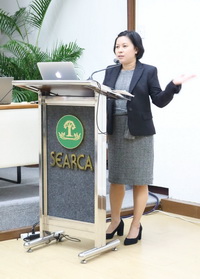
Study Reveals Philippine Lawyers' Perception and Attitude Towards Agri-biotech
January 30, 2019| |
 Results of the study, "Legal Discourse on Agri-Biotechnology: Implications to Lawyers' Engagement in Biotechnology in the Philippines" were presented to scientists and experts as well as representatives from the academe, national and international agencies/institutions, and partners from the biotech community during the Agriculture and Development Seminar Series (ADSS) of the Southeast Asian Regional Center for Graduate Study and Research in Agriculture (SEARCA) on January 29, 2018.
Results of the study, "Legal Discourse on Agri-Biotechnology: Implications to Lawyers' Engagement in Biotechnology in the Philippines" were presented to scientists and experts as well as representatives from the academe, national and international agencies/institutions, and partners from the biotech community during the Agriculture and Development Seminar Series (ADSS) of the Southeast Asian Regional Center for Graduate Study and Research in Agriculture (SEARCA) on January 29, 2018.
The study was a joint collaboration of SEARCA Biotechnology Information Center (SEARCA BIC) and the College of Development Communication at the University of the Philippines Los Baños. It focused on analyzing the Philippine lawyers' understanding and attitude towards agri-biotechnology and how these may serve as basis for defining their engagement in agri-biotech development.
Results reveal that despite having a low level of familiarity with key terms (i.e., genes, viruses, Golden Rice, GMO contamination, etc.), processes, and the existence of agri-biotech regulations in the country, lawyers still favor the application of agri-biotech in food and medicines provided that proper precautions are taken such as educating the public on its pros and cons, addressing risks of the technology, and having a structured regulatory process, among others. While lawyers perceive agri-biotech as an interesting topic, they do not find it as a lucrative area of legal practice as yet. Nevertheless, they are open to expand their knowledge on the subject, collaborate with scientists, and actively participate in regulating agri-biotech products in the country.
The researchers also analyzed the content of legal documents related to the Bt eggplant case and found that there is a need to improve the level of science literacy among the judiciary based on the legal arguments raised during the trial. Consequently, this lack of understanding on the nature of GM crops had implications on their decision to stop the Bt eggplant field testing in the Philippines in 2015, but was overturned in 2016.
For more updates about biotech news in the Philippines, visit the SEARCA BIC website.
| |
Biotech Updates is a weekly newsletter of ISAAA, a not-for-profit organization. It is distributed for free to over 22,000 subscribers worldwide to inform them about the key developments in biosciences, especially in biotechnology. Your support will help us in our mission to feed the world with knowledge. You can help by donating as little as $10.
-
See more articles:
-
News from Around the World
- Increased Knowledge about GM Foods Leads to More Positive Attitudes, Study Says
- NBMA Solicits Public Comment on the Application for GM Cassava Confined Field Trial
- Nigeria Approves First GM Food Crop for Open Cultivation
- Purdue Research Team Nails Down Important Plant Compound Pathway
- Researchers Discover Molecular Basis of Odor Detection in Plants
- Study Reveals Philippine Lawyers' Perception and Attitude Towards Agri-biotech
- 'Noisy' Gene Atlas to Explain How Plants Survive Environmental Changes
- New Insight into Unique Sugar Transport in Plants
-
Research Highlights
- Scientists Characterize Green Tea Genes Encoding Vital Enzymes
-
Beyond Crop Biotech
- Use of CRISPR to Control Pest Populations
- Transgenic Pigs Expressing β-xylanase Show Improved Nutrient Utilization
-
From the BICs
- Vietnamese Farmers Visit Demo Fields of New Maize Varieties
-
Resources
- Good Enough to Eat?: Next Generation GM Crops
-
Plant
- Japanese Scientists Identify Peptide and Receptor Responsible for Plant Root Spacing
- Gene Editing Can be Used to Make Wheat with Safe Gluten
-
Read the latest: - Biotech Updates (December 17, 2025)
- Gene Editing Supplement (December 17, 2025)
- Gene Drive Supplement (February 22, 2023)
-
Subscribe to BU: - Share
- Tweet
